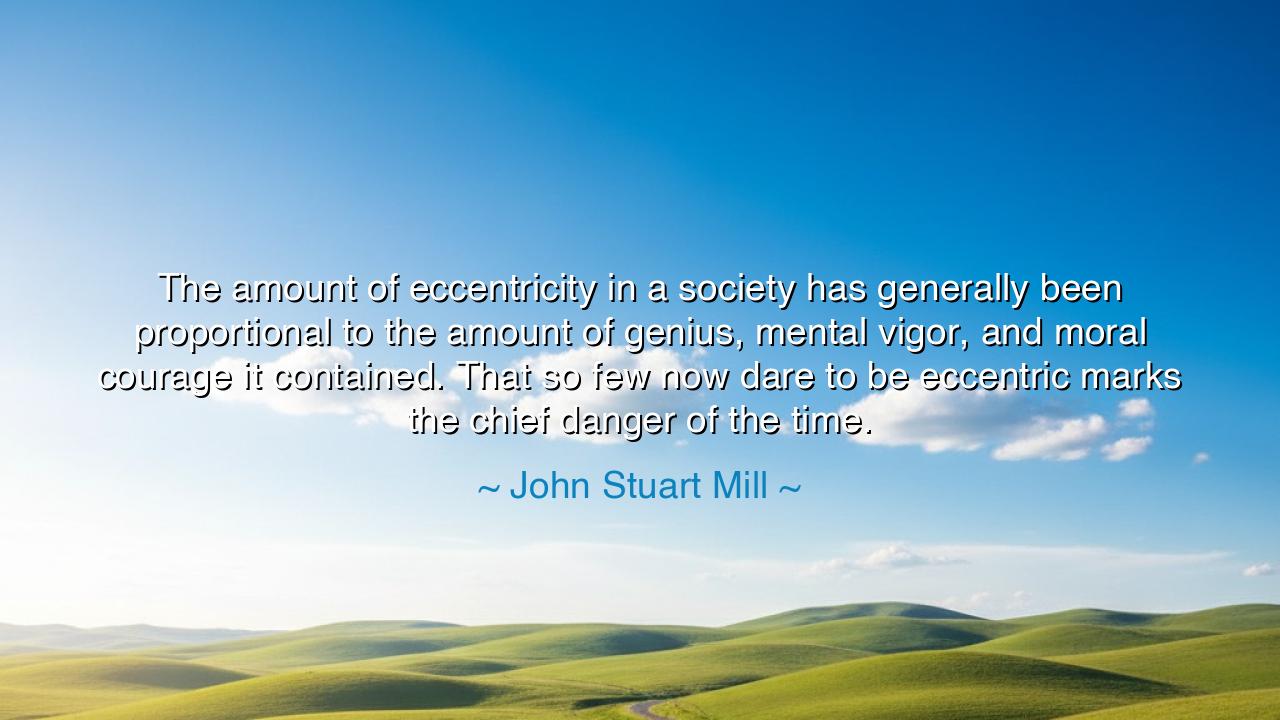
The amount of eccentricity in a society has generally been
The amount of eccentricity in a society has generally been proportional to the amount of genius, mental vigor, and moral courage it contained. That so few now dare to be eccentric marks the chief danger of the time.






In the thunderous wisdom of John Stuart Mill, philosopher and defender of liberty, we find a truth as urgent now as in his own age: “The amount of eccentricity in a society has generally been proportional to the amount of genius, mental vigor, and moral courage it contained. That so few now dare to be eccentric marks the chief danger of the time.” These words, born in the heart of the nineteenth century, resound with the solemn warning of a prophet. Mill, who devoted his life to the freedom of the human spirit, saw clearly that conformity is the slow death of greatness, and that the world grows dim when no one dares to stand apart.
In every age, the spark of genius has burned brightest in those who refused to bow before custom. The eccentric are the pioneers of thought—the ones who see beyond the horizon of ordinary minds. They are mocked in their time, only to be honored in posterity. Eccentricity, as Mill saw it, is not madness but moral strength—the courage to remain true to one’s vision when the crowd demands obedience. Where there is no eccentricity, there is no innovation; where all think alike, the light of progress flickers and fades.
Consider Galileo Galilei, who gazed through his telescope and dared to say that the earth moved around the sun. His eccentricity was called heresy; his truth, a threat to order. Yet his moral courage changed the course of history. So too did Socrates, who walked the streets of Athens questioning all things, unsettling complacent minds. His mental vigor was so great that it shook the foundations of his city, and for this, he drank the cup of hemlock. But his spirit lived on, immortal in the thought of generations to come. These are the souls Mill spoke of—the ones who dare to be different for the sake of truth.
Mill himself was no stranger to rebellion. Born into the rigors of utilitarian logic, he grew to challenge even his teachers, insisting that the highest freedom is not merely political, but spiritual—the freedom to think, to dissent, to live by one’s own conscience. He saw that as societies grow prosperous, they grow timid. Comfort breeds caution; uniformity replaces passion. The world begins to worship safety, and in doing so, it strangles creativity. When men and women fear to be eccentric, they fear to be alive.
The ancients understood this truth. The philosopher Diogenes lived in a barrel, laughing at the vanity of men, teaching by example that wisdom needs no adornment. The poet Homer, the artist Michelangelo, the scientist Newton—all were deemed eccentric in their time. Yet it is their vision, not the conformity of their peers, that still speaks to us across centuries. Every act of creation, every moral awakening, every revolution of thought has been the fruit of one soul’s defiance against the tyranny of the ordinary.
But what of our time? Mill’s warning echoes like thunder across the ages: “That so few now dare to be eccentric marks the chief danger of the time.” When society values approval more than truth, when youth seek likeness instead of purpose, when voices are silenced by the fear of standing alone—then the well of genius runs dry, and civilization decays not from war or famine, but from the death of courage. The greatest danger of the age is not chaos, but quiet conformity—the slow erosion of individuality beneath the weight of acceptance.
Let this, then, be your lesson, children of the coming dawn: do not fear to be eccentric. If your truth sets you apart, walk the lonely road with pride, for it is the road of the thinkers, the dreamers, the reformers. Be courteous, but unyielding; humble, but steadfast. Let your mental vigor challenge falsehood, your moral courage confront complacency, your genius illuminate what others cannot see. A society that honors conformity dies in silence, but one that celebrates eccentricity births greatness anew.
So live, not to blend, but to become. Defy the dull weight of imitation, and dare to let your life be a beacon of difference. For in your willingness to stand apart, you carry forward the eternal fire that has guided every age of progress. And perhaps, when future generations look back, they will say of your time what Mill once hoped of his own—that there were still those brave enough to be eccentric, and through their courage, the world was made brighter.






AAdministratorAdministrator
Welcome, honored guests. Please leave a comment, we will respond soon